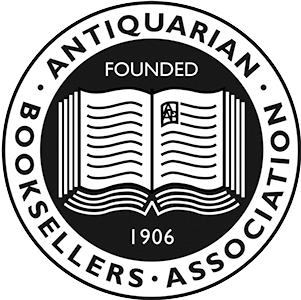Essays, by a Society of Gentlemen, at Exeter. Vol. I. Part I. Vol. I. Part II
[DOWNMAN (Hugh)]:
- Publisher: Exeter, Printed by Tewman and Son, no date, [1796]
Exeter, Printed by Tewman and Son, no date, [1796]. FIRST EDITION, [?second issue]. 2 volumes. 8vo, 247 x 148 mms., pp. [vi] - viii, 270; [2], 271 - 573 [574 blank], including half-title, engraved plates at pages 110 (foxed), 115, 118 (foxed), 124 (foxed), and 312 (slightly foxed), original boards, uncut, rather crudely rebacked with quarter vellum spine; front hinges cracked, boards worn, corners worn, but a good set. The physician and poet Hugh Downman (1740 - 1809) began his life as a parson, after a stint at Balliol College, but he turned to a career as physician, studying in Edinburgh for three years and living in an apartment with the poet Thomas Blacklock. He moved to London, began practicing medicine, and obtain an M D. from Aberdeen, probably by paying for it, which was not that unusual for an Aberdeen M. D. in the 18th century. His literary career began in 176, with one of the few poems published in Spenserian stanzas in the 18th century, The Land of the Muses. His best-known poem was in Miltonic blank verse, Infancy, or, The Management of Children (17774 - 1776). In the early 1980s, he founded the above literary group, and, as ODNB notes, "published a volume of essays in 1796; Downman wrote the introduction and three additional pieces. The society originally had nine members, subsequently increased to twelve, all of some distinction; they included Richard Polwhele and Isaac d'Israeli, father of Benjamin Disraeli, who became a friend and patient of Downman in 1795. While at Exeter d'Israeli wrote some verses in Downman's praise which were published in an anonymous pamphlet in 1807. The society survived for nearly twelve years but enthusiasm waned with the health of its founder and meetings were discontinued." Richard Polwhele (1760 - 1838) contributed a valuable essay on falconry, which appears in the first part of volume one, "Historical Outlines of Falconry," but he involved himself in a bitter quarrel with his fellow contributors over the publication of this essay, which might account for the fact that there are two different states of the title-page (see below). Downman wrote to Polwhele, "We go on but slowly with our volume. Hayter's paper on the Ptolemaic Chronology is but just begun. We inserted your Essay on Falconry, as being more original than that on the Progress of Literature, though not quite in order. The latter one, indeed, should be much curtailed; the third part seems to be the only one proper to be retained, with some short introduction, in which may be preserved your idea (I believe it is your own, and a just one,) of the origin of Pastoral Poetry; but on this I shall consult the other members of the Committee in time, and acquaint you more particularly, or send it to you if necessary." Some of the argy-bargy can be found in an article in The Anti-Jacobin Review and Magazine Or Monthly Political and Literary Censor, "A Letter to a College Friend, relative to some late Transactions of a Literary Society, at Exeter" (1798), which is, in fact, by Richard Polwhele. There were many contemporary positive reviews of the essays, e. g., in The Analytical Review, Or History of Literature, Domestic and Foreign, "The essays before us, proceeding from various pens of course possess considerable diversity of merit: they will, however, on the whole, reflect great merit upon the society; for several of the pieces afford striking proofs of ingenuity, diligence, and erudition, in their respective authors." One might compare Robert Southey's letter of 1 September 1799, "I am about to house myself at Exeter for a few weeks, till our habitation in Hampshire be vacant. there is a literary society at Exeter - Disraeli – Hole – & Dr Downmans [sic] who writes sonnets in blank verse. but they are a sort of monsters in literature, all furiously ministerial, even to intolerance of those who think otherwise – so the door is shut upon me, & I have no inclination to knock...." ESTC T188130 locates only the copy at Exeter Central library of the book with the above imprint. Another issue, with an errata leaf, states, "Printed by and for Trewman and Son. London: sold by Cadell and Davies, Strand; Robinsons, Paternoster-Row; and Robson, New Bond-Street," with an errata leaf, as well as a preliminary Advertisement dated 1796. The title-page in the present copy is clearly a cancel, which suggests that it is a second issue with the errata corrected. A similar copy was sold at Dominic Winter on 30 January 2007, with the bookplate of Guy Alymer and his ownership inscription; there is no bookplate or inscription in this copy. For the historical importance of the work, see Dafydd Moore, "Patriotism, Politeness, and National Identity in the South West of England in the Late Eighteenth Century," in ELH (2008), where the authorship of some of the essays is identified.
Share This Item:
Offered by
I work from home, but I am happy to see customers at almost any time by appointment.
Terms of Sale for
Payment by cheque, credit card, cash. New customers will be invoiced pro forma. Books may be returned within two weeks for any reason; refund within 1 month for any reason; negotiable after that, but no returns after one year.















